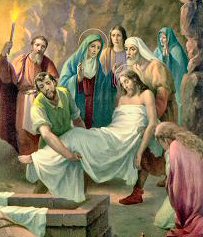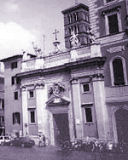From CatholicCulture.org:

Daily Readings for:March 22, 2012

The most comprehensive treatment of the Liturgical Year available online: daily reflections, saints, seasons, calendars, prayers, activities, and recipes.

Daily Readings for:March 22, 2012
(Readings on USCCB website)
Collect: We invoke your mercy in humble prayer, O Lord, that you may cause us, your servants, corrected by penance and schooled by good works, to persevere sincerely in your commands and come safely to the paschal festivities. Through our Lord Jesus Christ, your Son, who lives and reigns with you in the unity of the Holy Spirit, one God, for ever and ever.
- None
- None
- Prayer for the Fourth Week of Lent
- Lent Table Blessing 4
- Prayer Before a Crucifix
- Annunciation Novena
- Novena for the Annunciation
- None
RECIPES
ACTIVITIES
PRAYERS
LIBRARY
The clear will of God is the light and the salvation of all men. No one can desire anything good unless God desires it. Even the best of intentions, even seemingly worthy projects, are no good if they are not God's will at the moment. Distress, suffering, even death, can be accepted as His mysterious will. His creative love is always at work drawing the greatest possible good out of everything. Be the humble servant of God's will and you will be truly wise and always at peace. — Daily Missal of the Mystical Body
Meditation: One Is Your Father
One is your Father, who is in heaven; one is your teacher, Christ; you are all brothers!
One is your Father, who is in heaven; one is your teacher, Christ; you are all brothers!
In these words lies embedded the basic structure of Christian common life. The Christian ideal, life with the Church, is emphasized.
- First, the Fatherhood of God. God is the head of the family. For the early Christians it was a new and thrilling experience to be able to address God as Abba, Father. Down to the present time this approach to God is peculiarly Christian. There is here no juridical balance between accomplishment and merit, but a predominance of grace and love. Perhaps we have grown too accustomed to this unique privilege to be duly impressed. God is our Father, we His children. To be a child of God is to have high rank through grace; this is our nobility. Lent should deepen this Father-child relationship, should increase our confidence in God's fatherly goodness and care, should deepen our spirit of obedience and childlike reverence.
- Christ is our teacher and master. We are called Christians, but do we always act so as to deserve the name? Do we give constant attention to maintaining our Christian dignity? Are we humble enough to learn from Christ, as willing pupils? His message comes to us most clearly in the Gospel. A good student would never tire of examining the Gospel and following in his master's footsteps. Christ speaks to us also through His priests, in the Church. Let us hold fast His doctrine, and esteem His commands, especially His principal commandment, love. No longer I, but Christ lives in me!
- We are all brothers! We are God's great family, bound by a strong, common bond. Community is the word we have rediscovered-community in prayer, in sacrifice, in common action. We must make this truth operative in every group of which we are part, e.g., family, business, factory, parish, state! But what special significance this truth assumes at divine services, at holy Mass! There we are grouped around our teacher, Christ. We are His members, and He leads us to the Father. Yes, in the Sacrifice of the Mass all three are together: Father, teacher, and brothers.
Excerpted from The Church's Year of Grace, Pius Parsch

The Station is at the church of Saints Sylvester and Martin, which is one of the most venerable in Rome. It was originally built by Pope St. Sylvester, and still bears his name: but in the sixth century, it was consecrated to St. Martin of Tours. In the seventh century, it was enriched with the relics of Pope Saint Martin, which were brought from Chersonesus, where he had died a martyr a few years before. This church was the first Title of St. Charles Borromeo. It was also that of the learned liturgiologist, the Blessed Joseph-Mary Tommasi, whose body is now venerated in this church, and has been miraculously preserved, even to this day, in a state of incorruption.


 Thursday of the Fourth Week of Lent
Thursday of the Fourth Week of Lent
No comments:
Post a Comment